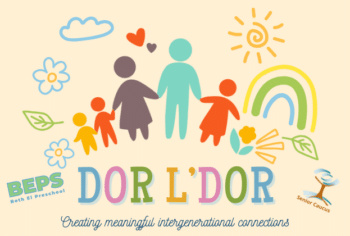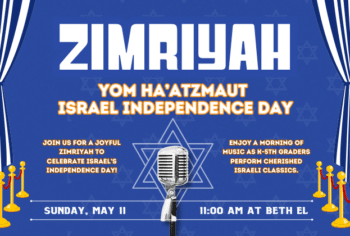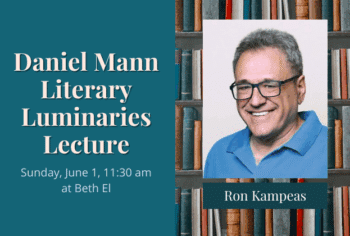We Stand With Israel
Beth El unequivocally stands with Israel as it fights terrorists who have the expressed goal of destroying Israel. We pray for the dead, injured, and captive.
During this time of uncertainty, we will stand together. This page includes resources and information on opportunities to be in community with one another at Beth El and with our neighboring congregations.
Israel Sermons and Talks
A New Old Paradigm: A Jewish Path Forward – Congregant Larry Sidman
A New Paradigm for Loving Israel – Rabbi Greg Harris, Rosh Hashanah Day 1 Sermon
Introducing our Shaliach, Yoel Gleizer
Upcoming Israel-Related Events at Beth El
Israel Blog
Entries are listed from newest to oldest.
- It’s Time to Ensure Israel’s Inclusive Future – April 22, 2025
- Vote for Your Vision of Israel by Larry Sidman with Karen Benezra – From the April 2025 Scroll
- Meet David Speer, Executive Director at the Maryland/Israel Development Center – March 24, 2025
- Joy, Grief, and Determination as Hostages from Kibbutz Nir Oz Return in Phase 1 Releases by Salo Zelermyer – February 24, 2025
- Israel and Gaza: No End in Sight by Eric Gartman – From the February 2025 Scroll
- The Campaign to Rebuild Nir Oz – October 28, 2024
- The Simchat Torah Project – October 8, 2024
Click here to see more Israel blog posts.
Israel Huddle Gathers Weekly
Building on the productivity of Beth El’s Covid Task Force, clergy and leaders of key groups at Beth El are meeting weekly to discuss programs, education, support, security, and communications related to the ongoing Israel-Hamas war. This group is working to support the myriad needs of our community – in the Beth El building, throughout our community, on college campuses, and in Israel. If you have any ideas for upcoming programming or resources you’ve found particularly relevant and useful to share, please contact the Beth El office at info@bethelmc.org.
SIGN: Demand Justice and Financial Compensation for Victims of Oct 7
CALL: One Phone Call a Day Can Help Bring Them Home
SEND: Letters of Hope Campaign
Resources
Readings and Resources to Help Understand the Israel-Hamas War by Thomas Warrick
Beth El congregant Tom Warrick is a member of the Beth El Security Committee with three decades of experience with the State Department, Department of Homeland Security, and the Atlantic Council. Some of his areas of expertise include national strategies combatting counterterrorism, Israeli-Palestinian affairs, and countering terrorist propaganda. All opinions (denoted by italics below) are solely those of the author. Click here to download a PDF with all resources.
Books (available from all major booksellers; links below are to publishers):
- David Fromkin, A Peace to End All Peace, Macmillan Publishers, https://us.macmillan.com/books/9780805088090/apeacetoendallpeace
One of the best single-volume histories of how and why the Middle East is still an area of conflict and challenge. Thesis in a sentence: If it took Europe fifteen hundred years after the fall of the Roman Empire to determine who would be a country and where the borders would be (e.g., Germany), why should anyone be surprised that barely a hundred years after the fall of the Ottoman empire, the Middle East would still not have fully settled who would be a country and where the borders are? - Geoffrey Blainey, The Causes of War, Simon & Schuster, https://www.simonandschuster.com/books/Causes-of-War-3rd-Ed/Geoffrey-Blainey/9780029035917
One of the best books ever written about the real reasons wars are fought, why both sides start a war when they both decide they prefer fighting to diplomacy, and it explains that wars usually end when the two sides agree on their relative power. Both sides in a war go in expecting they will win—and one of them (at least) will be proven wrong by the war’s end. The book provides a valuable framework for assessing the goals of both Israel and Hamas, and points to key insights about what it will take to end the enduring Israeli-Palestinian conflict. - Dan Reiter, How Wars End, Princeton University Press, https://press.princeton.edu/books/paperback/9780691140605/how-wars-end
Reaffirms Blainey’s point that one of the fundamental purposes of war is to resolve a clash over the relative power of the two sides to impose their will on the other side. Goes beyond Blainey in explaining that credibility (which can mean several different things) is vitally important to ending a war, because of fears that the other side’s commitment to abide by a war-ending peace settlement may not be credible. This is an especially powerful insight in understanding how hard it will be to end both the Israel-Hamas War and the Israeli-Palestinian conflict.
Best non-U.S. English language media sites to understand the war:
- The Times of Israel, https://www.timesofisrael.com
Excellent coverage of events in Israel and that affect Israel during the war. Right now, they are the best. Paywall. - Haaretz, https://www.haaretz.com
Not quite as good as it used to be—its liberal political bias affects both its news coverage and its OpEd pages. Paywall. - Jerusalem Post, https://www.jpost.com
Picks up stories other news sites miss or get only later. - Al-Jazeera, https://www.aljazeera.com
Strong pro-Palestinian bias, with strong anti-Israel views, but important to give a perspective into the complete disconnect between what Israelis and Arab read about the war.
Websites with war-related coverage and opinion pieces you don’t see elsewhere:
- Institute for the Study of War’s Iran Update (which covers the Israel-Hamas war), https://www.understandingwar.org/backgrounder/iran-update-june-28-2024
Best website for detailed coverage of daily and weekly military moves of both sides. Read the pdf version to get the most detailed updates. - The Jerusalem Strategic Tribune, https://jstribune.com
Publishes a range of international security and experts’ commentary. - Axios’s Barak Ravid, https://www.axios.com/authors/barak_ravid
Closely channels the thinking of senior White House officials on Middle East issues. - Atlantic Council, https://www.atlanticcouncil.org
Publishes a range of international security and experts’ commentary. - Washington Institute for Near East Policy, https://www.washingtoninstitute.org
Publishes a range of international security and experts’ commentary. - Middle East Institute, https://www.mei.edu/
Publishes a range of international security and experts’ commentary. - Wilson Center, https://www.wilsoncenter.org
Publishes a range of international security and experts’ commentary. - Israel Policy Forum, https://israelpolicyforum.org
Michael Koplow and Shira Efron are both essential reading. - Center for a New American Security, https://www.cnas.org
Publishes a range of international security and experts’ commentary.
Interesting webcasts and virtual programming:
- America at a Crossroads, https://www.jewsunitedfordemocracy.org
Run since 2020 by the Los Angeles-based Jews United for Democracy and Justice, offers a range of experts on U.S. politics and the Middle East. Every Wednesday and most Mondays at 8 pm Eastern time.
Reports and articles and source materials of note:
- Plan for Postwar Gaza, https://www.wilsoncenter.org/publication/plan-postwar-gaza
A group of former senior officials with extensive experience in postwar planning, crisis stabilization, and Middle East affairs.
Event at the Wilson Center discussing the plan: https://www.atlanticcouncil.org/event/report-launch-a-plan-for-postwar-gaza/ - Secretary of State Antony Blinken’s “Tokyo Principles” setting out the United States position: https://www.state.gov/secretary-antony-j-blinken-at-a-press-availability-41/
- Hamas Charter, 1988 (English translation):
https://avalon.law.yale.edu/20th_century/hamas.asp - Hamas Principles and Policies, May 2017 (English translation):
https://irp.fas.org/world/para/docs/hamas-2017.pdf - Opinion polling in Gaza: Palestinian Center for Policy and Survey Research, Dec. 13, 2023, Public Opinion Poll No. 90:
- https://pcpsr.org/sites/default/files/Poll%2090%20English%20press%20release%2013%20Dec%202023%20Final%20New.pdf
- Palestinian Center for Policy and Survey Research, March 2024:
https://pcpsr.org/sites/default/files/Poll%2091%20English%20press%20release%2020%20March%202024.pdf
The Palestinian Center for Policy and Survey Research is the most highly regarded source of opinion polling data on what people in the West Bank and Gaza are currently thinking. Taken under challenging conditions, their data must be read with an understanding of the challenges of getting reliable, unbiased answers—but with that caveat, if you know how to interpret the data, this is extremely powerful and insightful research. Funded by a European think tank.
A short and partial list of interesting X (formerly Twitter) feeds:
- Thomas Warrick, Atlantic Council: @TomWarrickAC
Former senior State Department official, former Department of Homeland Security Deputy Assistant Secretary for Counterterrorism Policy - Akbar Shahid Ahmed, Huffington Post: @AkbarSAhmed
Great coverage of what people inside the State Department are thinking but aren’t saying publicly. - Ahmed Fouad Alkhatib, Atlantic Council: @afalkhatib
Palestinian-American with strongly pro-Palestinian and anti-Hamas views. - Carmiel Arbit, Key Bridge Strategies: @c_arbit
Formerly with AIPAC, now an Atlantic Council nonresident senior fellow. - Aaron Boxerman, New York Times: @aboxerman1
New York Times reporter based in Jerusalem and London. - Merissa Khurma, Wilson Center: @MerissaKhurma
Program director for the Middle East Program at the Wilson Center. - Shalom Lipner, Atlantic Council nonresident senior fellow: @ShalomLipner
Former adviser in the office of several Israeli prime ministers. - Matthew Levitt, Washington Institute for Near East Policy: @Levitt_Matt
Director of the Reinhard Counterterrorism Program, former senior U.S. Department of the Treasury official on counterterrorism issues. His podcast about Lebanese Hizballah, “Breaking Hezbollah’s Golden Rule,” https://www.washingtoninstitute.org/policy-analysis/podcast-breaking-hezbollahs-golden-rule-season-1, is mandatory listening. - Mary Beth Long, former U.S. Assistant Secretary of Defense for International Security Affairs: @mbldefense
- Jonathan Lord, Center for a New American Security: @JonathanLordDC
Former U.S. government official with extensive Middle East and Capitol Hill experience - David Makovsky, Washington Institute for Near East Policy: @DavidMakovsky
Director of the Program on Arab-Israel Relations at WINEP. - Aaron David Miller, Carnegie Endowment: @aarondmiller2
Former senior Middle East negotiator in Democratic and Republican administrations. - Jonathan Panikoff, director, Atlantic Council: @jpanikoff
Former Deputy National Intelligence Officer for the Middle East and other senior intelligence positions; now heads the Scowcroft Middle East Security Initiative. - Dennis Ross, Washington Institute for Near East Policy: @AmbDennisRoss
Former senior Middle East negotiator and White House official across multiple administrations. - Dana Stroul, Washington Institute for Near Eastern Affairs: @dstroul
Former Deputy Assistant Secretary of Defense for the Middle East. - William Wechsler, Atlantic Council: @WillWechsler
Former National Security Council and Department of Defense official, now heads the Atlantic Council’s Middle East Center
More Resources
Along with the resources compiled above by congregant Tom Warrick, here are additional resources that you may find useful:
- The Media Line – The Media Line is a nonprofit, independent news agency that covers Israel and the Middle East
- West Bank Settlements Explained – Israel Policy Forum
- Debunking the False Equivalency Between Israeli Hostages and Palestinian Prisoners – AJC
- AJC’s People of the Pod: What Happens Next— AJC’s Avital Leibovich on the Hostage Deal and Challenges Ahead
- How to Have Conscientious Conversations About the Israel-Palestine Conflict – ADL
News Articles
- Do Women and Children Really Make Up 70% of the Gaza Death Toll? – HonestReporting
- The Fall of Syrian Dictator Bashar al-Assad – Stand with Us
- How the Gaza Ministry of Health Fakes Casualty Numbers – Tablet Magazine
- Jewish moms look at our children and think of Anne Frank. Now, we’ll think of Kfir and Ariel Bibas, too – Carly Pildis, The Forward (mentioned in Rabbi Harris’s Shabbat sermon on February 22)
Interesting Podcasts and Virtual Programming
- Call Me Back with Dan Senor: Ending the Lebanon War – with Nadav Eyal
- Stars of David with Elon Gold (comedian who talks up great topics): Shai Davidai is the modern Mordecai
- Being Jewish with Jonah Platt – Diverse stories of Jews and issues across media, entertainment, identity and more
Webinar/ Briefings Recordings
- What Was the UN Partition Plan (Resolution 181) and Why Does it Matter Today?
- What is Hamas? Unraveling the Global Terror Network
- Masorti Olami Security Briefing recording featuring retired IDF Major General Noam Tibon
- Jewish Educators Project recording “How to Talk to Children about Israel Today”
- Consulate General of Israel in New York briefing (continuously updated) – Content warning: contains graphic statistics.
- SCN National Update On Domestic Security Guidance Amidst Hamas Terrorist Attacks On Israel
- USCJ: Click here for a list of resources compiled by the USCJ, including prayers, workplace resources, family resources, and more.
- Talking about the Israel-Hamas War – JCRC
Prayer Resources
- A Prayer for Israel in this Time of War by Rabbi Naomi Levy
- A Prayer for the Shmini Atzeret War from The Rabbinical Assembly and Masorti Olami
- Koren Prayer for Israel
- Koren Prayer for IDF
- Koren Prayer for Missing/Captured Individuals
- Acheinu Lyrics
- Vigil Program Script from Rabbi Aderet Drucker, The Den Collective
- Poems for Jerusalem
- Prayer by Rabbi David Wolpe
- Prayer for Israel at War by Rabbi Michael Knopf
- God, Oh God: A Prayer on the Outbreak of War Simchat Torah 5784 by Simkha Y. Weintraub from Ritualwell
- Prayer for Peace in Israel during Wartime by Rabbi Ron Aigen from Ritualwell
- Today’s Shema: For the Victims of Terrorist Attacks in Israel by Cyd Weissman from Ritualwell
- Prayer for the Current War by Rabbi Gil Nativ
- A Statement from Rabbi Jacob Blumenthal from the Masorti Global Prayer Gathering
- Hillel International Script for Prayer Vigil
- Psalms and Prayers for Israel compiled by ExploringJudaism.org
- Prayers & Tefillah Resources from ExploringJudaism.org
- D’var Torah from Masorti Israel’s David Arias, a reservist called to IDF duty last week
Mental Health Resources
- J-Caring Community Support Line with JSSA and The Jewish Federation of Greater Washington
- JQ Helpline – The JQ Helpline provides inclusive support and resources for LGBTQ+ Jews, their families, and allies.
- Crisis Text Line – If you need support, text SHARE to 741741 to connect to a live volunteer Crisis Counselor or via web chat. Remember – you are not alone.
- Mental health resources from Blue Dove Foundation
- Mental Health & Self Care – Exploring Judaism
- Mental health & social media guidelines – Prizmah Center for Jewish Day Schools
Resources for Families with Children
- Resources for Teaching About Israel in Crisis: Click here to visit the Jewish Education Project’s curated series on teaching about Israel in times of crisis.
- For Parents with High School Students: AJC has compiled all the resources parents need to answer their high schoolers’ tough questions, engage with their school administration, and help build a safe educational environment for their children.
Conflict in Israel
- How to Talk to Kids About What’s Happening in Israel Right Now – Kveller
- Talking to Kids about the Israeli–Palestinian Conflict: Helpful Resources for Parents – New York Family
- Terrorism and War: How to Talk to Children –American Academy of Child & Adolescent Psychiatry
- How to Talk to Children about the Conflict in Israel – URJ
- Tips for discussing Israel with children with disabilities and mental health needs – JGateways
- “How to Talk to Teens about Israel” – Jewish Educators Project recording
Handling Difficult Emotions & Topics
- Books to Help Kids Handle All Kinds of Uncomfortable Emotions – Brightly
- What to Tell Kids When News is Scary – NPR PodCast
- How to Talk to Your Kids About Scary Situations – PJ Library
- Talking to Children about Violence: Tips for Families and Educators – National Association of School Psychologists
- @ThePediatricianMom – Krupa Playforth
- @MidrashManicures – Rabbi Yael Buechler
Ways to Help
- Jewish Federation of Greater Washington: 100% of your donation to Federation’s Israel Crisis Relief Fund will provide essential support for those in need, with aid distributed swiftly through our partners on the ground. Donate online here.
- Magen David Adom: Israel’s National Emergency Pre-Hospital Medical and Blood Services Organization. Click here to donate.
- Friends of the IDF: FIDF is the sole organization designated by the IDF in the United States to collect donations for its soldiers. Click here to donate.
- Ben-Gurion University Resilience Fund. The BGU community was not only disproportionally affected (and continues to be) as the largest employer in the Negev, but our community is driving the humanitarian efforts to help all those whose families members have been killed, reservists called up, providing emotional support, housing, childcare, and more. Click here to donate.
- Contact your elected officials: Click here to email your elected officials to write to them regarding the hostages and your concerns about Israel.


